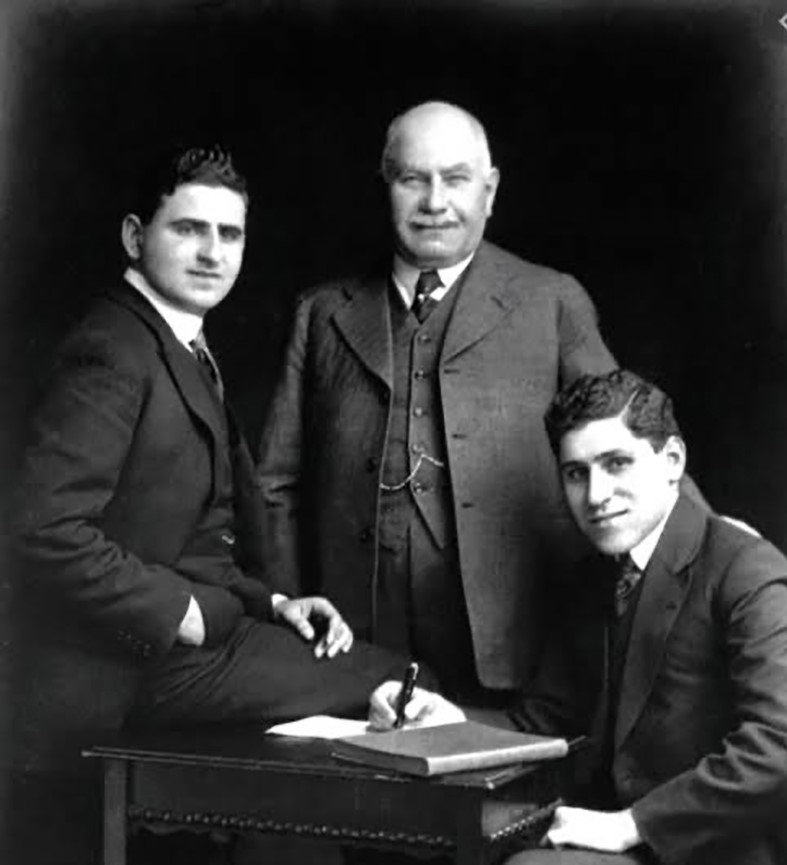
Featured Item

Antisemitism, epidemics, war and opium, the Jewish families that dominated Asia
Published
2 years agoon
The legendary Sassoon and Kadoorie families not only achieved huge business success in India and China, but also dominated trade in Asia for 150 years, starting in the 19th century.
The various rulers of Baghdad in 1800 turned to the Jewish community, including the wealthy Sassoon family, for help with taxation and in building trade routes, said Pulitzer Prize-winner Jonathan Kaufman, the author of The Last Kings of Shanghai: The Rival Jewish Dynasties That Helped Create Modern China.
Kaufman, speaking at a recent SA Jewish Report webinar about the Sassoon and Kadoorie dynasties, said, “When the head of the Sassoon family would be taken to meet with whomever was in charge of government, he was carried through the streets of Baghdad on a sedan chair. Everybody in Baghdad, Jew, Gentile, or Muslim, would bow their head respectfully as he passed.”
Politics soon turned against the Baghdad Jews, however. The 37-year-old David Sassoon, the treasurer of Baghdad between 1817 and 1829, “was about to take over the Sassoon family empire, but he was put in prison because the government wanted to get some ransom money”, Kaufman said. “David’s father quickly got him out of the jail. Realising it wasn’t safe for the Sassoons anymore, he put his son on a ship.”
David washed up in India no later than 1832. “He began to work with the British there, and quickly became a millionaire. One of the ways he built his fortune was through the opium trade. Opium was legal at the time. It was grown in India and sold in China.”
The rest of David’s family settled in India, started making money in many ways, and invested in steamships and The Telegraph newspaper. “David deployed his eight sons across China, and then stayed in touch with them via The Telegraph.”
The Sassoons had taken over the opium trade within a few decades, making about $1 billion (R18.3 billion) from the opium trade. “With that money, the Sassoons were able to expand into factories, real estate, and so on.”
Flora Sassoon, David’s great-granddaughter, turned out to be a brilliant businesswoman at a time when women in India not only didn’t have the right to vote, but couldn’t even be seen in public.
“Flora ended up running the Sassoon empire from her living room.” When a plague came to Bombay, Western doctors developed a vaccine at Flora’s request, but the Indian workers who staffed the Sassoon factories were afraid to take it.
“So, Flora took the vaccine first. The idea that a Western woman would take a shot, that she would bear her arm in a photograph, all these things kind of broke all the rules in India, but it ended up being very effective. The workers took the vaccine, and the company was saved. Her brothers-in-law in London began to think she wasn’t going to be so easy to control, so they staged what was a boardroom coup, which took all her power away. Ultimately, she ended up moving to London, became a philanthropist, and a bit of a Jewish scholar.”
The Sassoon dynasty fell apart as the brothers stopped working productively together, says Sarah Sassoon, a historian of the David Sassoon dynasty (but not related to David). “It’s a whole saga covered in the book, The Global Merchants, by Joseph Sassoon, one of David’s many descendants around the world today, but none live in South Africa.”
Roland Sassoon, who established Sasfin Bank and Sissy Boy Jeans in South Africa, isn’t a descendant of David, but his grandfather, Ezra Ishayek, changed his surname to Sassoon when he bought his textile business from the family who came from David Sassoon.
Roland’s father, Sydney Sassoon, was schooled in Baghdad, and after World War II, took his family to South Africa where the warmer climate could help his malaria.
Elly Kadoorie left home at the age of 14, and made his way to India. “He showed up in China at 18 years old in 1880 and worked for one of the Sassoon branch offices,” Kaufman said. “He then made his way to Hong Kong, where he ended up doing business deals and working with all sorts of people. By the time he was 30, he was a millionaire.
“He married Laura Mocatta of an eminent British Jewish family. She announced that she was going to travel with Elly throughout China as he pursued his business deals. Even better for me, she kept a diary of her adventures. While Elly negotiated business deals, she was in a rickshaw going through war-torn parts of China.”
Laura concluded that China was being held back by its prohibition of education for girls. “This is kind of an astonishing declaration in the early 1900s. She persuaded her husband to start funding schools for Chinese girls. She became the conscience of the Kadoorie family.”
After the Kadoories settled in Shanghai with their two boys, a fire broke out in their mansion. “Laura escaped convinced that their Chinese servant was trapped inside, so she ran back into the burning house to look for the Chinese servant.”
Laura was disoriented by the smoke. She collapsed and died. “The Chinese still talk about this today. The idea that a wealthy British woman would rush into a burning house to save a Chinese servant is something unbelievable to them.”
Victor Sassoon, David’s great-grandson, was a British playboy and hotelier. “He decided to go to India and China where the Sassoon money was being made. He took all his money out of India and put it all into China. He built an incredible hotel. Many of the art-deco buildings today in China were built by Victor or others trying to emulate him.”
Jewish refugees who fled Europe started arriving in China via ships in the late 1930s.
“Victor tried to house them in some of his buildings. The Kadoories set up a school staffed by refugee teachers. Victor soon embarked on almost a con job with the Japanese. The Japanese had invaded China already and were antisemitic. Victor told the Japanese colonel who was put in charge of ‘the Shanghai Jewish problem’ to come to his hotels. Victor’s waiters and bartenders spied on the Japanese and reported on them. His goal was to stop the Japanese from refusing to allow the immigration of Jewish refugees into China. Ultimately, after Kristallnacht, the Japanese realised what was going on and closed the gates. Victor fled the country. The Kadoories didn’t get out in time. They were arrested by the Japanese. Elly died in Japanese captivity.”
Elly’s son, Lawrence Kadoorie, rose from a Japanese prison camp to restore his family’s fortunes.
South African businessman Shaun Matisonn’s great uncle and aunt found themselves sitting opposite the Kadoories while on a train in the United Kingdom. “The Kadoories invited my great uncle to represent them in Hong Kong, so they went to Hong Kong, and lived there for many years,” Matisonn said. “My uncle was the chazzan in the shul, and became a lawyer for one of Kadoorie’s sons.”
Kadoorie descendants can be found worldwide, but there are none Sarah knows of in South Africa.










